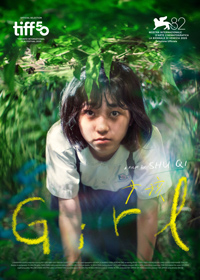This Girl’s Life: Qi Outlines Inherited Abuses
 For her directorial debut Girl, actress Shu Qi wields a heavy hand in a film which seems to scream ‘hurt people hurt people.’ Set in late 1980s northeastern Taiwan, a gloomy tale of an abused mother and her equally traumatized eldest daughter unspools in the Keelung Harbor region. A quiet, sometimes lush landscape shot by DP Yu Jing-Pin (The Breaking Ice, 2023) serves as an ambivalent reminder of an untapped beauty right at their fingertips. A constant state of miserabilism pervades the interiority of these characters, with fractured flashbacks depicting how the abused becomes the abuser. Unfortunately, a lack of subtlety with its characterizations allows for a sense of overkill, its narrative as mind-numbed as its adolescent protagonist.
For her directorial debut Girl, actress Shu Qi wields a heavy hand in a film which seems to scream ‘hurt people hurt people.’ Set in late 1980s northeastern Taiwan, a gloomy tale of an abused mother and her equally traumatized eldest daughter unspools in the Keelung Harbor region. A quiet, sometimes lush landscape shot by DP Yu Jing-Pin (The Breaking Ice, 2023) serves as an ambivalent reminder of an untapped beauty right at their fingertips. A constant state of miserabilism pervades the interiority of these characters, with fractured flashbacks depicting how the abused becomes the abuser. Unfortunately, a lack of subtlety with its characterizations allows for a sense of overkill, its narrative as mind-numbed as its adolescent protagonist.
Hsiao-Lee (Bai Xiao-Ying) is a sullen teenager living in a sordid apartment in 1988 Taiwan with her younger sister, mother Chuan (9m88) and abusive stepfather Chaing (Roy Chiu). She faints regularly at school, but not enough for the local nurse to intervene. Her overworked mother seems disinterested in Hsiao-Lee, especially compared to the favorable treatment bestowed upon her younger daughter. When a new girl at school befriends Hsiao-Lee, it upsets the dysfunctional balance normalized at home, and her mother’s own traumatic past repeats itself.
If there’s a fatal misstep to Girl, it’s with the rudimentary depiction of its male assailants. Both Roy Chiu’s Chiang and Chuan’s own father are so monotonously one-note they become caricatures. We spend more time in the present of 1988 with Chiang, a despicable alcoholic who beats, cajoles, and rapes not only his wife but also, it’s suggested, regularly sexually assaults Hsiao-Lee. The childhood sexual abuse is formatted less explicitly, through the nightmarish recollection of Hsiao-Lee, who has made a habit of sleeping in a portable clothes closet as a way to block out the violence, though this, it seems, is to little avail. Of course, since she’s not Chiang’s biological daughter, her existence is partially the reason for Chuan’s own banishment from home and all its resulting misery and is meant to explain why she’s treated with all the care afforded a mongrel dog.
School life seems no less welcoming until the arrival of the assertive Li-Li, presented as a blossoming beauty whose own home-life is less than ideal following her father’s infidelity and the separation of her parents. However, it’s this relationship with eventually goads Hsiao-Lee to a rebellious night on the town which at last leads to her own banishment, albeit a blessing in disguise. Considering the two-hour running time, what’s lacking is a better development of how this friendship between the two young girls is actually a transformative impetus.
Curiously, Girl plays like a more drastically staged sister film to Chie Hayakawa’s Renoir (2025), also dictating a young girl’s neglect but in 1987 Tokyo. Qi, who clearly has an eye for exceptional visuals as a way to juxtapose sordid social realities, casts herself in the film as a potential for narrative levity. Playing Chuan’s boss, she’s a beautiful, outspoken woman with her own salon, but her ability to assist her employee is clearly limited. R&B singer 9m88 excels at anguish, and is given room to explore the most layered character in the script, perhaps best seen in her treatment of Hsiao-Lee at school, unleashing her pent up rage upon her child, perhaps regretting it, but never apologizing. As Hsiao-Lee, Bai Xiao-Ying has the tall order of depicting the effects of significant abuse and dehumanization, but her interiority is limited almost exclusively to moroseness.
Tragic and depressing, Girl does make an impression and shoulders the weight of its narrative adroitly enough to make the uncomfortable subject matter resonate, though with little variation. Considering it’s the directorial debut of the iconic Shu Qi, muse of Hou Hsiao-hsien, there’s an inherent desire to compare it to his body of work, and, as such his 1987 Daughter of the Nile briefly comes to mind. A final, teary exchange leaves the audience unsettled with realistic ambiguity, suggesting a continuation of distress, as sometimes relationships require more work to repair than is realistically possible.
Reviewed on September 4th at the 2025 Venice Film Festival (82nd edition) – In Competition. 125 Mins.
★★½/☆☆☆☆☆


